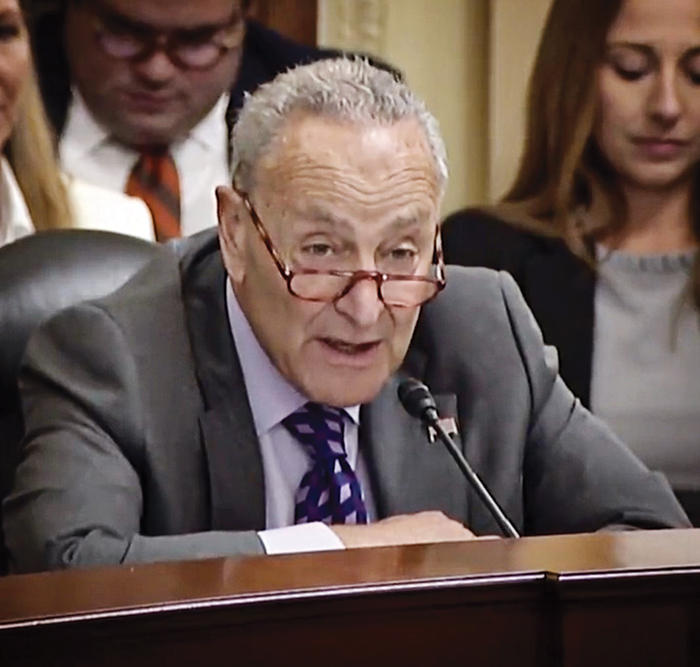Photo Courtesy of Sen. Schumer
Senate Majority Leader Chuck Schumer
By Forum Staff
Senate Majority Leader Chuck Schumer on Sunday revealed that New York’s fed-funded “cooling assistance benefit” has been forced to stop accepting applications for the summer—because demand for assistance is up some 200 percent compared to last summer.
Schumer said New York is the gold star when it comes to administering these types of federal-funded programs and that the Department of Health & Human Services has done a tremulous job with getting the money out the door on time, but with rising costs and climate change bearing down on the city, Long Island and beyond, the feds must hone in to help New York with maximum flexibility and resources that can get help to everyone who needs it, especially those at the greatest health risk.
Schumer also pushed for a $1 billion increase, nationally, in LIHEAP funding via the upcoming budget. Schumer said that if this summer is any indication of demand and need, that winter could be just as stressful for New York and the nation. Schumer said these critical LIHEAP funds, which he has prioritized for New York for decades, help elderly people who live alone, and don’t want to go into a nursing facility afford their utility bills or buy an AC unit. Schumer said HEAP also helps families with medical bills who risk their health sitting in heat waves because they cannot afford their full utility bill. Schumer detailed this specific program, and the relevant fed funds, as he made the case to HHS to hone in on states like New York that have high need and record-setting demand.
According to the CDC, extreme heat events can be dangerous to health – even fatal. These events result in increased hospital admissions for heat related illness, as well as cardiovascular and respiratory disorders. The CDC also said that extreme heat events can trigger a variety of heat stress conditions, such as heat stroke. Heat stroke is the most serious heat-related disorder. It occurs when the body becomes unable to control its temperature. Body temperature rises rapidly, the sweating mechanism fails, and the body cannot cool down. This condition can cause death or permanent disability if emergency treatment is not given. Small children, the elderly, and certain other groups including people with chronic diseases, lower-income populations, and others have higher risks for this condition. Higher temperatures and respiratory problems are also linked. One reason is because higher temperatures contribute to the build-up of harmful air pollutants.
Schumer noted that the CDC also points out that reducing the release of heat-trapping gases like CO2 can help protect our health and wellbeing by decreasing impacts on our climate system. Activities that reduce the amount of heat-trapping CO2 in the atmosphere are many of the same things we already know prevent health problems. Schumer said that is why, aside from pushing for these benefits and supporting cooling assistant programs, the feds must also work to tackle the macro causes of global climate change.
Schumer said that New York has decreased the cooling assistance demand backlog from 30,000 to about 21,000 in the past week alone.
Schumer said that, right now, New York has about $250 million of fed dollars in its HEAP account and that over 1.6 million New Yorkers have benefited from overall HEAP help since January. Schumer said he will push for an increase in this federal pot in the upcoming budget so that New York can continue to meet rising demand.

